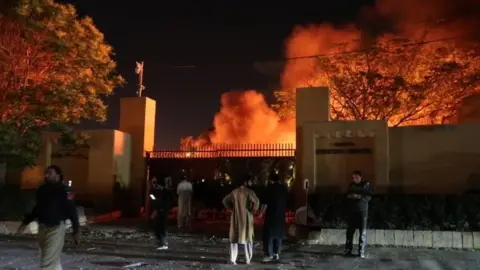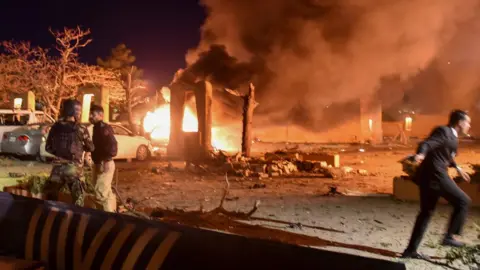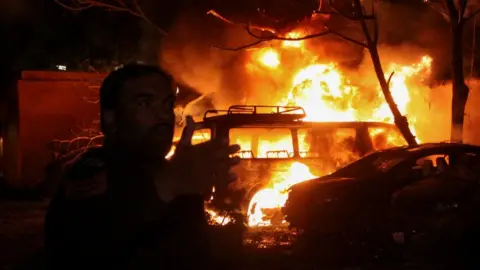Pakistan hotel bomb: Deadly blast hits luxury venue in Quetta
 EPA
EPAA bomb explosion at a luxury hotel in the Pakistani city of Quetta, the capital of Balochistan province, has killed five people and wounded 12.
The Pakistani Taliban said it was behind the blast in the car park of the Serena Hotel, and that it had targeted police officers and other officials.
A Taliban spokesman described it as an attack by a suicide bomber using a car filled with explosives.
Initial reports had suggested the target was China's ambassador.
Ambassador Nong Rong is understood to be in Quetta but was not present at the hotel at the time of the attack on Wednesday.
The Pakistani Taliban did not mention the Chinese ambassador in its statements.
In recent months the group, and other militant organisations, have stepped up attacks in tribal areas near the border with Afghanistan.
The Pakistani Taliban - or Tehrik-e Taliban Pakistan (TTP) - has been carrying out attacks across the country for years, but the group's influence and activities dramatically declined following a military offensive in 2014.
On Wednesday, the group said it had carried out the bomb attack in the car park of the Serena hotel in Quetta. It caused fire to spread to several nearby vehicles.
Two security guards were reported to be among the dead. All guests at the hotel were safe, officials told local media.
 Reuters
ReutersFootage of the blast was shared on social media in the aftermath and it showed fire raging at the site.
The Serena Hotel is the best known in Quetta, and provides accommodation for government officials and visiting dignitaries.
Interior Minister Sheikh Rashid Ahmad confirmed for Pakistani broadcaster ARY News TV that a car bomb had been used and that Mr Nong had been at a separate function at the time.
 Reuters
ReutersOn Thursday, Pakistan's Prime Minister Imran Khan said he was "deeply saddened by the loss of innocent lives in the condemnable and cowardly terrorist attack in Quetta".
"Our nation has made great sacrifices in defeating terrorism and we will not to allow this scourge to rise again," he tweeted.
A spokesman for China's foreign ministry, Wang Wenbin, said the country condemned the bombing and was "saddened by the innocent victims".
He said there were no reports of casualties or injuries among China's delegation in the region, Reuters news agency reports.
The Chinese embassy in Pakistan told China's Global Times media outlet that all staff there were safe.
Balochistan's provincial Home Minister Ziaullah Lango, meanwhile, told reporters that Mr Nong was "in high spirits" and that his visit to Quetta would conclude on Thursday.
Balochistan province, near the Afghan border, is home to several armed groups, including separatists.
Separatists in the region want independence from the rest of Pakistan and accuse the government and China of exploiting Balochistan, one of Pakistan's poorest provinces, for its gas and mineral wealth.
Separatists were blamed for an attack two years ago on a hotel at Gwadar, a port project funded by China. And last year, militants from the Baloch Liberation Army said they were behind a grenade attack on the Pakistani stock exchange in Karachi.
Who are the Pakistani Taliban?
With its roots in the Afghan Taliban, the TTP movement came to the fore in 2007 by unleashing a wave of violence.
Its leaders have traditionally been based in Pakistan's tribal areas, but it is really a loose affiliation of militant groups.
The group has killed hundreds of Pakistanis in suicide bombings and other attacks over the years, and has also co-ordinated assaults on numerous security targets.
What was arguably one of the most internationally criticised of all Pakistani Taliban attacks took place in October 2012, when schoolgirl Malala Yousafzai was attacked on her way home in the town of Mingora.
At least three key figures of the Pakistani Taliban were killed the following year in US drone strikes, including the group's leader Hakimullah Mehsud.
Pakistan stepped up its own operations against insurgents after Taliban militants killed 132 children at a school in Peshawar in 2014.
The army later declared the entire border region with Afghanistan "militant-free", but militant activity resumed there in 2018, coinciding with the rise of a non-violent nationalist movement.
